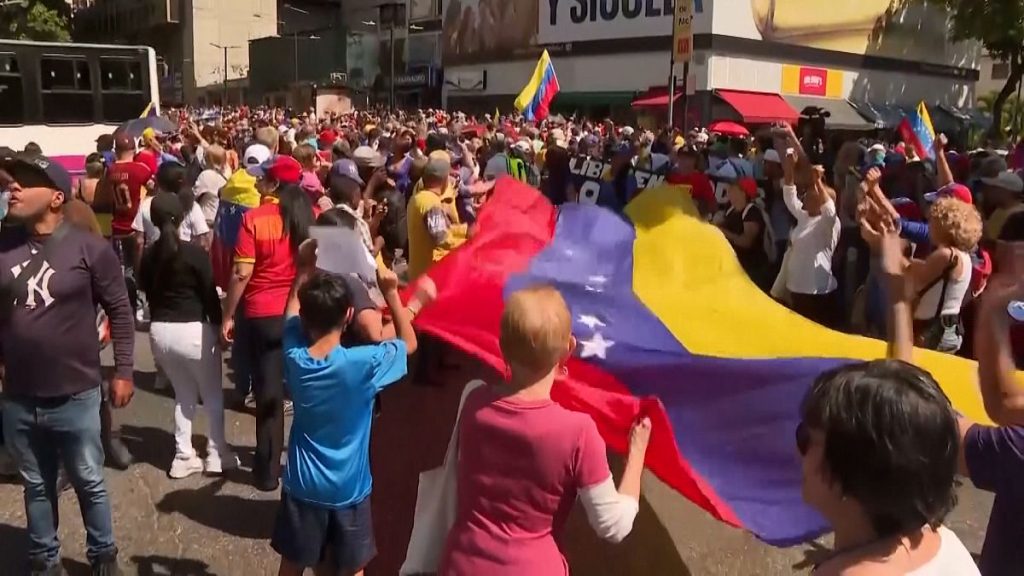The political atmosphere in Venezuela was thick with tension as the country braced for the presidential inauguration of Nicolas Maduro. The impending ceremony was shrouded in controversy, with the opposition vehemently contesting Maduro’s claim to victory, citing overwhelming evidence of electoral fraud and a landslide win for their own candidate. This disputed election result marked a significant departure from previous presidential races, where, despite frequent allegations of irregularities, the electoral authorities had at least provided detailed vote counts to support the declared outcome. This time, however, the absence of transparent data further fueled the opposition’s claims and amplified the public’s distrust in the electoral process. The stage was set for a potentially explosive confrontation between the government and its increasingly vocal detractors.
As the inauguration loomed, the simmering discontent among the populace began to manifest in spontaneous displays of resistance. A small group of opposition demonstrators took to the streets, their numbers swelling as passers-by, galvanized by shared grievances and a sense of urgency, joined the burgeoning protest. These initial acts of defiance signaled a shift in the opposition’s strategy, moving from legal challenges and political maneuvering to direct action in the streets. This grassroots mobilization reflected the deep-seated frustration with Maduro’s rule and the perceived illegitimacy of his claim to power. It also underscored the growing willingness of ordinary citizens to risk confrontation with the government in order to express their dissent.
Maria Corina Machado, a prominent figure in the opposition movement, seized upon this rising tide of popular discontent and issued a clarion call for nationwide demonstrations. Her appeal resonated with a population weary of economic hardship, political repression, and the erosion of democratic norms. Machado’s call to action represented a significant escalation in the opposition’s efforts to oust Maduro, signaling a transition from localized protests to a coordinated national movement aimed at challenging the very foundation of his presidency. The stakes were high, as both the government and the opposition braced for a potentially protracted and volatile struggle for control of the country’s future.
The government, seemingly unfazed by the growing unrest, proceeded with preparations for Maduro’s inauguration. In a display of defiance, the authorities orchestrated a dramatic drone show at a military airbase in Caracas, projecting the image of President Maduro and other national symbols onto the night sky. This symbolic act was interpreted by many as a deliberate attempt to project an image of strength and unwavering control, despite the mounting evidence of electoral irregularities and the growing chorus of dissent. The drone show, while visually impressive, served as a stark reminder of the government’s grip on the military and its willingness to utilize state resources to reinforce its authority.
The juxtaposition of the government’s orchestrated display of power and the spontaneous eruption of street protests highlighted the deep divisions within Venezuelan society. On one side stood the entrenched government, backed by the military and seemingly impervious to the growing calls for change. On the other, a burgeoning opposition movement, fueled by popular discontent and a desire for democratic reform, was taking to the streets to voice its demands. The international community watched with apprehension as the country teetered on the brink of a major political crisis, the outcome of which remained uncertain.
The underlying issues driving the conflict were multifaceted and deeply rooted. The Venezuelan economy, once a regional powerhouse, had been crippled by years of mismanagement, corruption, and declining oil prices. Hyperinflation had eroded the value of the bolivar, leaving millions struggling to afford basic necessities. The government’s increasingly authoritarian tactics, including the suppression of dissent and the erosion of democratic institutions, had further alienated large segments of the population. These factors combined to create a volatile political environment, ripe for unrest and potentially violent confrontation. The inauguration of Nicolas Maduro, far from signaling a return to stability, seemed poised to usher in a new and unpredictable chapter in Venezuela’s ongoing political crisis.














